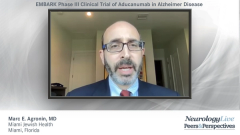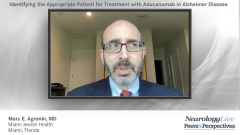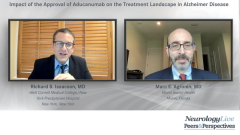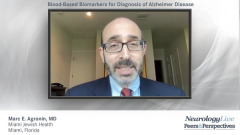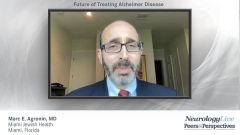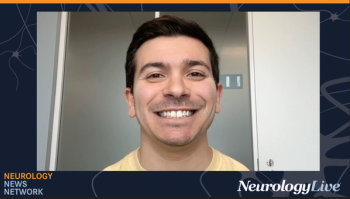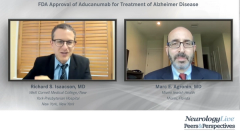
FDA Approval of Aducanumab for Treatment of Alzheimer Disease
Expert neurologists, Richard S. Isaacson, MD, and Marc E. Agronin, MD, describe the journey to the FDA approval of aducanumab for the treatment of Alzheimer disease and what this means for clinicians.
Episodes in this series

Richard S. Isaacson, MD: Hello, and thank you for joining this NeurologyLive Peers and Perspectives presentation, entitled “Advances in the Treatment of Alzheimer's Disease”. Today, we're going to be discussing the recent FDA approval of aducanumab, and the current status of drugs in development for the treatment of Alzheimer's. My name is Dr Richard Isaacson. I'm the director of the Alzheimer's Prevention Clinic at Weill Cornell Medicine in New York-Presbyterian in New York City. I'm also an assistant dean of faculty development at Weill Cornell. Today, I'm very privileged and looking forward to this chat, Marc. I'm here with Dr Marc Agronin. He's the senior vice president of behavioral health and chief medical officer for the MIND [Medical Investigation of Neurodevelopmental Disorders] Institute at Miami Jewish Health in Miami, Florida. Thanks so much for joining. Let's begin. Dr Agronin, we've been on this road together for over 15 years or so.
Marc E. Agronin, MD: A long time.
Richard Isaacson, MD: When I was back in Miami, you were the 1 I referred my patients to for all the clinical trials, and for the amyloid studies. We've had patients in these amyloid studies for 15 years. I still remember the first person infused in the phase 2 bapineuzumab. What a week it's been with the approval of aducanumab. Marc, I don't even know where to begin because it's such a milestone in our field, but when you heard aducanumab was approved, what was the very first thing to go through your mind?
Marc E Agronin, MD: Well, first of all, Richard, thank you for the invitation to be here. You're right, we've worked together a long time with many mutual patients. It's been a long journey. I think my initial reaction this week was 1 of hope, that we are making some moves in terms of being able to offer disease modification to patients even though we know that there's a lot of questions and some controversy over this. I think as you mentioned before, we've been on a long journey here. Reflecting back 15 years ago, we knew back then that the scope of Alzheimer's disease, but we really struggled to accurately diagnose it. We knew that immunotherapy played a role with these transgenic mice that are really seemed – we could see a cleared amyloid from their brains and they seemed to get better. We were on the verge of these new immunotherapy trials in humans. There was a lot of excitement. Now, 15 years later, we have something on the market. I think we're excited, we're hopeful, but there's a lot to talk about and a lot of issues we still need to address here.
Richard Isaacson, MD: I think the same exact thing from my end. I didn't know, I couldn't make predictions. I just didn't know what was going to happen. I think most people didn't know. I think some people felt 1 way. Other people felt another way. When it comes to the quality of scientific data, having done many investigator-initiated trials where I've created the trial, I've written the IRB [institutional review board], I've written the study protocol, I've gone for months or years sometimes with statisticians, I understand how hard it is to get quality research done. I have empathy. Even when you have billions of dollars or millions of dollars, whatever it is to invest in a clinical research pipeline and clinical trials, it is hard to get studies done. How valid is the data? What's the data quality? We can argue about that a lot, and we can talk about the studies and what one study showed them, what the other did and what the statistical analysis and future. We can talk about that, but I feel like we're on a different side now. We now have a drug that's approved for patients. I feel like we should probably focus more on what does this mean? The drug was approved, and the FDA labeling and the package insert for the treatment of Alzheimer's disease, full stop. The drug was approved based on reducing amyloid in the brain. Interesting.
Marc E. Agronin, MD: The FDA has done something a little bit different this time because especially when an initial label has started to come out, we all realize that in part, this is really focused on amyloid reduction and to some extent over time, it's going to stand or fall on the integrity of the amyloid hypothesis for Alzheimer's disease. We know from the very first study that Eloise Alzheimer did on his patient, where he looked at brain tissue. We know that amyloid and tau, these plaques and tangles are the hallmarks of this disease. The question all along has been, “Are they the only hallmarks?” If you get rid of one or both of them, what does that do for the disease?
We've seen clearly through research that these medications can reduce amyloid burden. We know that. The real question is what does that mean? I sometimes use the analogy of if your house is on fire and you put out the fire, maybe that's going to stop any further problems, but you've got a lot of damage there. We know that's the case with brains, with Alzheimer's disease, and for that matter, for other forms of neurocognitive disorders. By the time they walk into their office, there's so much damage in the brain. The question is, “What can we possibly do to mitigate that?” It's a dilemma, and we're still going to see over time with the ongoing EMBARK trial, which is still looking at individuals on aducanumab and gathering data. That's going to really help tell the full story over the coming years.
Richard Isaacson, MD: This is the first drug approved in almost 20 years. I think it's 18 years, or so. When you look at the failures, you look at the minimal success, this is the first time I've actually gone back and read a package insert in a while. I remember package inserts as being quite long. I remember they would unroll them and read every word in small print. This one had a PDF, so I could make it larger. I stopped several times during reading it because I didn't know what the package insert would say. Would there be a requirement for an amyloid test to prove that the person has amyloid if you're going to be given an amyloid drug? That's 1 thing. Well, there wasn't that written in the package insert, so now is that the responsibility of the physician? That's 1 thing I wanted to chat with you about. Number 2, it's for the treatment of Alzheimer's disease. When I think about the term Alzheimer's disease, I think of stage 1, 2, and 3. Stage 1, preclinical, pre-symptomatic Alzheimer's, where there's amyloid in the brain, but no symptoms yet. Forty-six million Americans are estimated to have preclinical Alzheimer's. I call that Alzheimer's. Then there's MCI due to Alzheimer's, mild cognitive impairment due to Alzheimer's disease. They have amyloid in the brain. They have mild symptoms, but they don't have dementia. They can still take care of themselves. Then I also think about Alzheimer's disease as mild, moderate, and severe Alzheimer's disease, where the person can no longer take care of themselves. When I was in med school, that's what I learned Alzheimer's disease was- dementia, if they had it, that's when the disease started. We now know Alzheimer's pathology begins in the brain decades, 20 to 30, or probably more even decades before symptoms began. There is a lot to talk about Marc, but when you think about these 2 big elephants in the room, maybe, the FDA has allowed, or given the physician the free roam or wherewithal to figure this out, to figure out which patients, which stage, do we need a marker? Do we not? What are your thoughts about the amyloid biomarker aspect and what are your thoughts about what truly is the treatment of Alzheimer's disease? What are the stages when to use it? What do you think?
Marc E. Agronin, MD: You've really described the major shift that we've seen in the past decade, and that is going from making a good guess on whether someone has Alzheimer's disease to now seeing evidence. I refer to this imaging modality as basically virtual brain biopsies because we get a window into, “Is there amyloid, is there tau in the brain?” On the one hand, it's brought us clarity. It's allowed us to study treatments and individuals who actually have what we're trying to target. They have amyloid in the brain, or now with newer studies, they have tau in their brain. That's been an important change. It's also, as you said, allowed us to recognize that this disease doesn't begin when someone walks in our office. It's been going on a long time.
On the other hand, it's proved vexing, because we're seeing individuals who are minimally or not symptomatic at all, and they have amyloid in their brain. What does that mean? And now tau, what does that mean? We can't predict the course. As you and I both know, as we follow people over virtual, literally for the rest of their lives, we've seen many different courses. We really appreciate the heterogeneity of this disorder. I have individuals who if you do nothing and we know they have amyloid, they tend to do pretty well and drifts slowly over the years, and we see other people who really progress very quickly. We see the same thing in these clinical trials. I would add on top of this, what makes it more confusing, is as people come in who in past years, I would say, absolutely, this is Alzheimer's disease. They fit the clinical picture. They fit the progression, but they have no amyloid in their brain, or they have no tau in their brain. What do we diagnose them with? We can say this is a major neurocognitive disorder, but that doesn't bring much clarity. As much as this new era of biomarkers has really helped us to understand better what's going on in someone's brain has also brought so many more questions and areas that need to be clarified over time.
Now we bring aducanumab into this. The question is, and unfortunately, at least at this point, the label is not helpful, who will qualify for this? I think this is a dilemma because as clinicians, you and I can talk about how we make a diagnosis, but we both know that a lot of this is going to be the hands of the payers. They may say, “You have to have a spinal tap. You have to have amyloid scan.” But will they pay for it? There's a lot yet to be revealed in the coming weeks and months before we really have a sense for who will be able to get this treatment who will have access to it. That lies ahead.
Richard Isaacson, MD: Dr Agronin, thanks so much.
Marc E. Agronin, MD: Thank you. My pleasure.
Transcript Edited for Clarity
Newsletter
Keep your finger on the pulse of neurology—subscribe to NeurologyLive for expert interviews, new data, and breakthrough treatment updates.

